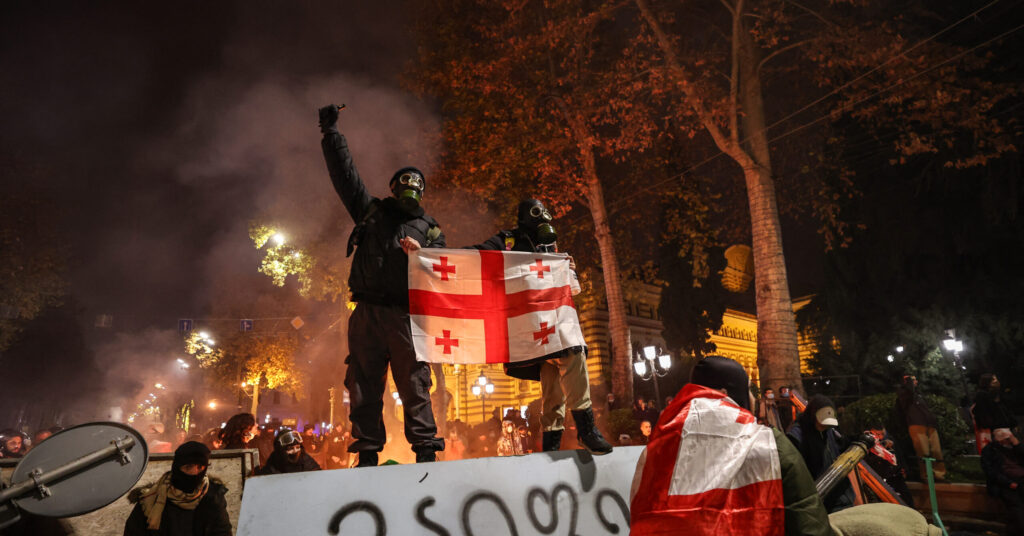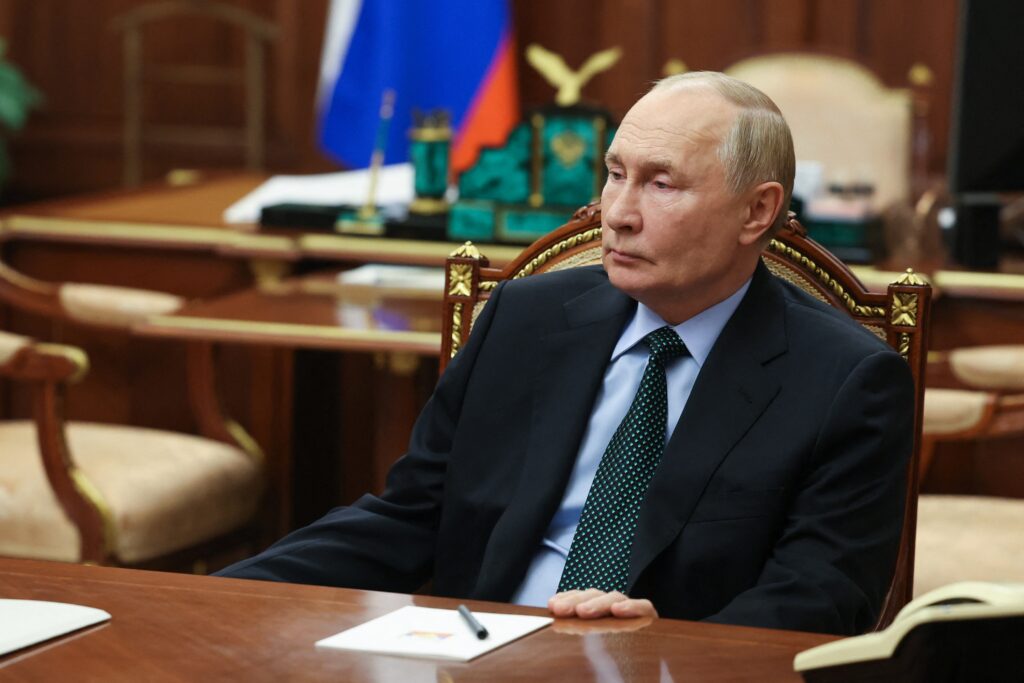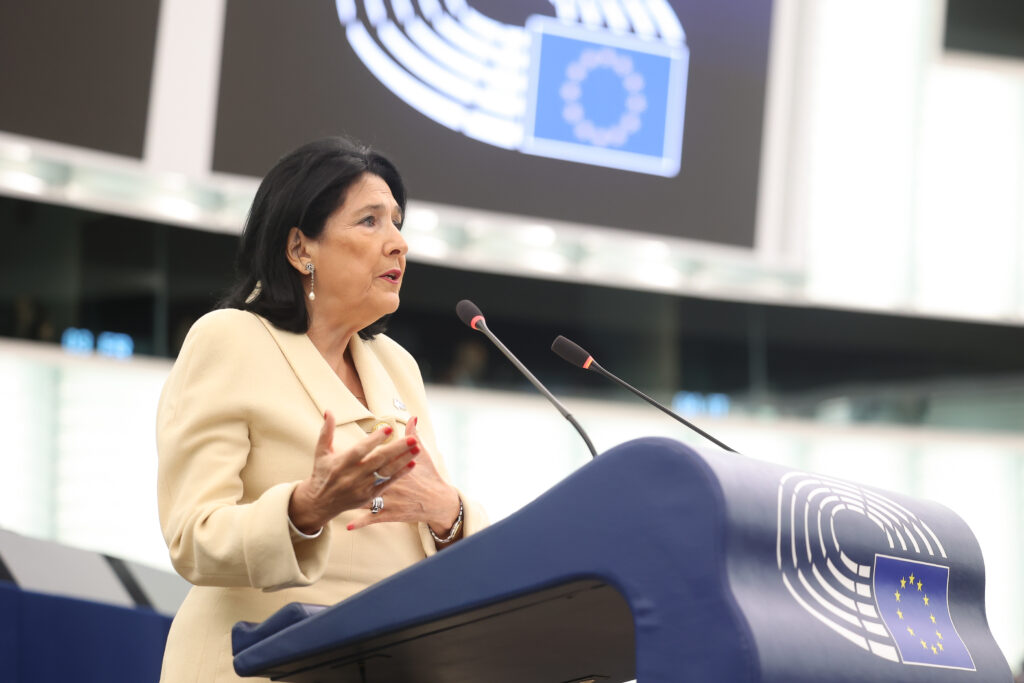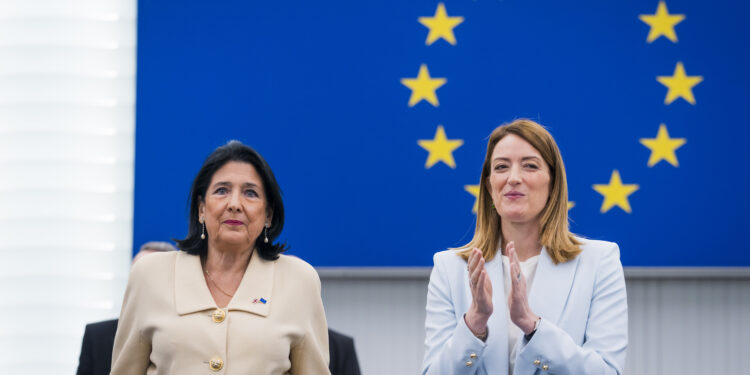Brussels – From Tbilisi to Strasbourg to issue a cry for help. That is what Georgian President Salomé Zourabichvili did, appealing to the MEPs meeting in the plenary session this morning (Dec. 18) to advocate for the cause of the opposition forces against the ruling party, Georgian Dream, while street protests continue in the small Caucasian country and the institutional clash between the state’s top leadership shows no sign abating.
In a semi-deserted Chamber, the outgoing president of the Republic, Salomé Zourabichvili, made a heartfelt appeal to the MEPs to exert pressure on the other EU institutions – first and foremost the European Council, which is scheduled to meet tomorrow to discuss foreign policy and should also address the situation in Georgia – to intervene more decisively on the rapid backsliding of her country, which under the leadership of Premier Irakli Kobakhidze is slipping ever more away from Brussels and closer to Moscow.
Protests for freedom
“We are facing a crucial juncture because at certain moments we feel as if we are going back to 1991 as if history is repeating itself,” Zourabichvili said, explaining that mass protests that have been stirring up the capital and other cities in recent weeks illustrate well how citizens are “reacting to what they see as an expropriation of their freedom, of their future, and independence” by Georgian Dream, the party-machine created by pro-Russian oligarch Bidzina Ivanishvili, which has been in power since 2012.
The protests, which have been going on continuously for 21 days (i.e., since Kobakhidze announced on November 28 the stop to EU membership negotiations until 2028), actually began as early as last spring, when the government had parliament adopt what the president brands as a “Russian law” (that she symbolically vetoed, to then be overridden by the hemicycle): a measure that — closely tracing a similar law in force in the Federation — requires entities that receive more than one-fifth of their funding from abroad to declare themselves “agents of foreign powers.”

It is a serious situation, Zourabichvili told the European Parliament. “The only time when there are massive demonstrations is when an existential issue is at stake, as it is today,” she reiterated, stressing that the “peaceful movement of civil disobedience,” which arose “spontaneously” in response to the government’s actions and now “embraces society as a whole,” is making two fundamental demands: “Give us our vote, give us back our future in Europe.”
She said it was not a question of starting a revolution. “No one wants to defenestrate anyone. There is only a demand to repeat freely the elections” held on Oct. 26, and that local and international observers denounced as irregular and opposition forces as illegitimate.
“There are not two countries” in civil conflict, she continued: “On the one hand, there is the Georgian people, and on the other, there is the government that oppresses them.” Zourabichvili accused the party of Ivanishvili and Kobakhidze of “building a Russian state” in Georgia. From the introduction of repressive measures modeled on Moscow to the pro-Kremlin narrative about the war in Ukraine (as vividly displayed during last fall’s election campaign), the anti-LGBTQ+ propaganda, and the accusation of Tbilisi’s Western partners (Washington and Brussels at the forefront) of being responsible for all the Caucasian country’s ills.
The Russification of Georgia
This “Russification of the state,” she warned, “is slow but inexorable,” as “all institutions are under the control of a single party”– Parliament, government, Central Election Commission, the judiciary apparatus “totally occupied by Georgian Dream” – and this became blatant in the October election. Those “Russian elections, piloted in a sophisticated manner” through, among other things, changing the election code, intimidation of public officials, and electronic voting that was “specifically designed without adequate biometric controls” to ensure its integrity. Then, there was the violation of the universal nature of voting, with “one million Georgians in the diaspora unable to vote because polling stations were not allowed to open in embassies, as was the case in Strasbourg.”
After the elections, everything came to a head, Zourabichvili recalled. First, there was a “violation of the Constitution, with the first session of the Parliament convened” not by herself but “by the president of Parliament, who had not been officially recognized yet” and while “all appeals” against the electoral process were still under exam. Then came the suspension of negotiations with Brussels, through which Kobakhidze “wants to put the future of Georgia on hold without even having a mandate to do so” – because precisely the head of state (who noted that she faced two impeachments) does not recognize the validity of his re-election. Therefore, “Georgian citizens will not rest until there are free elections because this is the only democratic way out of the crisis.”
Irakli Kobakhidze: I want to thank the five countries that voiced a position in support of the Georgian people at the Council of the European Union. These are Hungary, Slovakia, Italy, Spain, and Romania. They defended the interests of the Georgian people at the… pic.twitter.com/E0VfzsgCKx
— Georgian Government (@GovernmentGeo) December 17, 2024
The president then lashed out against the government’s use of “lies as a modus operandi,” recalling yesterday’s incident in which Kobakhidze spread the news via social media that Italy, Spain, and Romania allegedly joined Hungary and Slovakia in opposing sanctions (proposed Monday by the High Representative Kaja Kallas at the Foreign Council in Brussels) against Georgian Dream and the law enforcement responsible for the violence on protesters.
The chancelleries concerned (including the Farnesina) officially denied those claims later, and Tbilisi authorities corrected themselves. However, “there was no publicity has to the corrections, so the Georgian Dream supporters who watch TV do not know that their government is lying,” Zourabichvili pressed.
Europe at the window
You are there too. Europe is there, and its credibility is at stake” because “a country that has just received candidate status cannot be abandoned and cannot trample all democratic norms. You cannot allow this. You cannot allow European values and principles to be humiliated,” Zourabichvili continued, addressing the MEPs. Moreover, on November 28, the European Parliament declared the previous month’s election outcome illegitimate, calling for new elections under international monitoring.
However, the issue does not only have an internal dimension, the head of state emphasized. Here, “Europe’s strategic interest is at stake: Georgia has been, is, and will continue to be the Western stronghold against Russia,” she said, warning that “if Georgia falls under Russian control,” the risk is that the entire Caucasian region will slip permanently into the orbit of Moscow, which already has its foot firmly in Armenia and Azerbaijan.
“Georgia is part of the war Russia has declared on Europe,” Zourabichvili remarked, asking rhetorically, “If Russia fails to succeed in Ukraine, will it have to win in Georgia? If it cannot succeed in Moldova, will it have to succeed in Georgia or Romania?” The latter reference is to the interferences certified by Bucharest in the first round of the presidential elections, held on November 24 and surprisingly won by the ultranationalist Călin Georgescu, only to have the Constitutional Court annul them.

Russian president Vladimir Putin (photo: Vyacheslav Prokofyeva/Afp via Sputnik)
Supporting civil resistance
Then came the jab: “If we are honest, Europe has not been up to the task,” she admitted, reproaching her EU partners for “having only half responded to this challenge” and urging them to “do much more.” “You know that Georgians are fighting day and night,” she reminded her audience, and that “the European flag has been banned in Tbilisi” while the people “continue to wait for clear measures” from Brussels and Washington. “I hope it will not take an even more serious crisis for Europe to act,” she added bitterly.
We need “political support and attention at the highest levels” because “Georgians need to know that they are not alone.” In this sense, she thanked the delegation of MEPs who traveled to Tbilisi in solidarity with the protesters, urging the EU to take a more direct role in managing the crisis shaking the candidate country.
Another direction in which the Union can move, she said, is in the area of justice: “We need very strict monitoring of the politicized trials being held in Tbilisi, “bringing to the release of hundreds of prisoners sentenced to even nine years of imprisonment.” Likewise, those allegedly guilty of torture must be prosecuted, she reiterated, recalling the comments from the National Ombudsman, who compared the actions of Georgian security forces to intentional acts of torture.
“Help us win”
.Concluding her speech, Zourabichvili reiterated that fulfilling the demands of the protesters — the annulment of the October vote and a rerun of the elections — represents “the only peaceful way forward.” “We want elections,” she repeated, assuming the role of leading the parliamentary and civil opposition front: “If there are no elections, there will be a crisis that you will have to manage, and it will be much more difficult.” “You have to use your levers as geopolitical Europe,” she implored because if the EU is unable to intervene in a country of less than 4 million people, “how is it going to counter the giants of the 21st century?”

No matter what — alone or with the help of Brussels — the president predicts that “Georgians will win this battle and defend its freedom, its democracy, and its future.” Unlike the Ukrainians, she explained, “We are fighting not with weapons but with our bare hands, differently, to fight something that will impact everyone’s future,” the vested interest of the Kremlin, which is destabilizing the Old Continent inside and outside the EU. “Georgia will not give in,” she claimed before leaving the podium in the center of the hemicycle, “but we expect you to act to defend European values.” At the end of her speech, which MEPs greeted with a standing ovation, some parliamentarians waved Georgian flags.
But, by law, these are the last days Zourabichvili will represent her country. Her term expires on Dec. 29, and Mikheil Kavelashvili, an ultranationalist, anti-Western, pro-Russian former soccer player, has already been named to succeed her. The incumbent head of state, however, has repeatedly refused to step aside and recognize as valid the election of her successor by a parliament she deems illegitimate, further escalating the head-on clash between national institutions.
English version by the Translation Service of Withub








